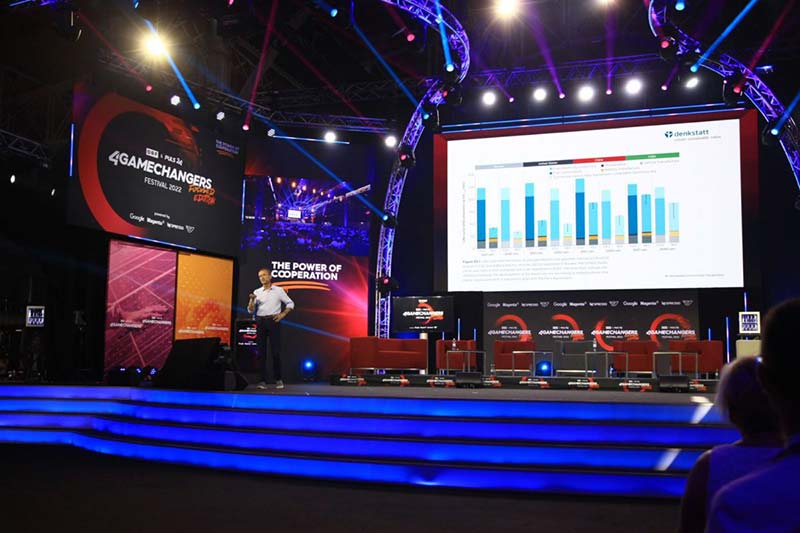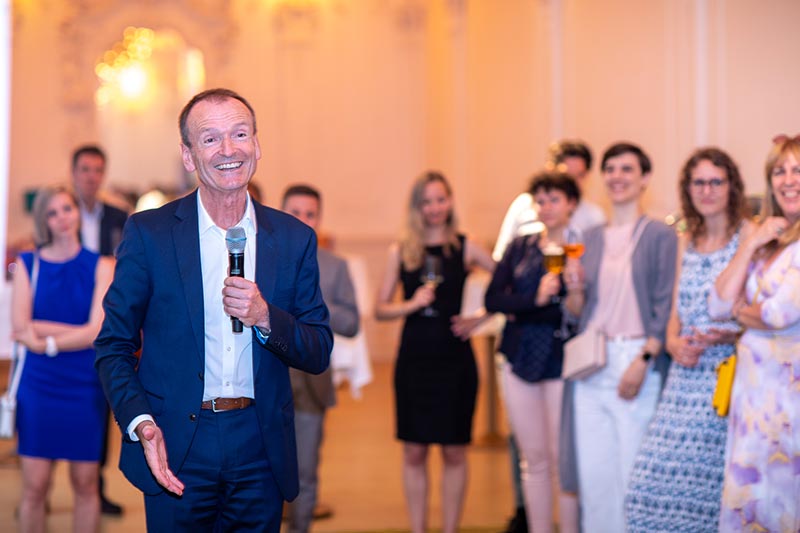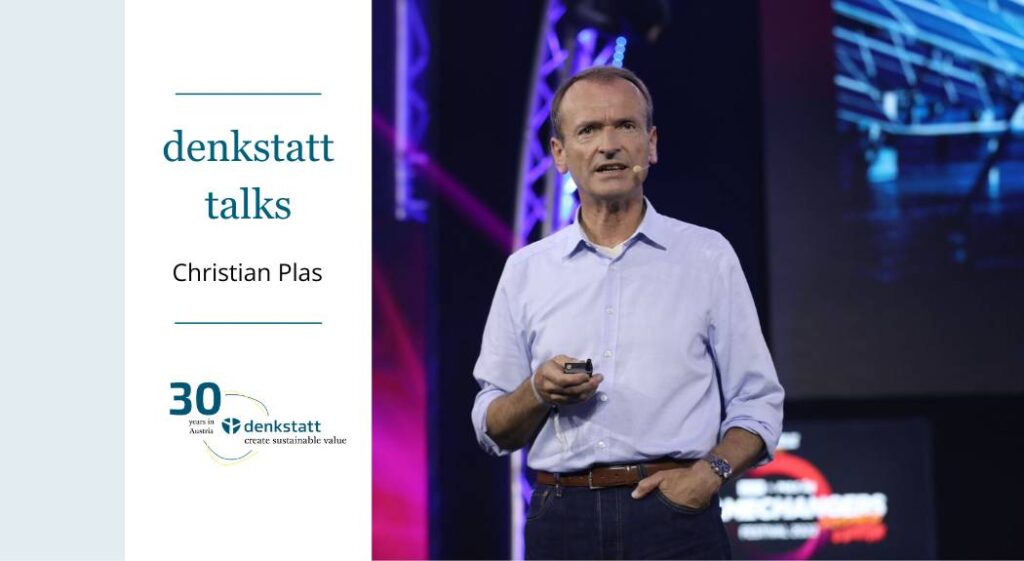It has been 30 years since denkstatt was founded. A lot has happened in the meantime. In a personal interview, Christian Plas, Managing Director and co-founder of denkstatt, tells us more about the beginnings and his assessment of the current situation and the future against the background of ecological developments.
Dear Christian, 30 years ago denkstatt was founded. In the last 3 decades, you have managed to grow denkstatt into an international group. You have made a name for yourselves in sustainability consulting, and that beyond the borders of Austria. Anyone involved in sustainability – especially, but not only – knows the name denkstatt. How did the name come about?
Christian: At the time, I had the idea of starting my own business and asked Thomas Salzer if he wanted to join me. He agreed right away. Over a bottle of sparkling wine at Café Hawelka, we immediately discussed what the company should be called. As a technician, I would rather have chosen an edgy abbreviation, classic with three letters or something. Tom was our creative head and is blessed with great ingenuity. With that, we knew we needed an unusual name for our venture. That evening we agreed on denk.mal. But the next morning Tom called me and said, “denk.mal is not working. How about denkstatt?” And it was immediately clear – that’s it! And that was 30 years ago now.
Before the name, the idea of founding a company came up. Why did you want to start a company and what was your vision?
My intensive contact with the industry inspired me at that time. I wanted to make progress in the environmental field. And not in the sense of aftercare, but proactively starting with the processes so that companies can conserve more resources and save energy. Such consulting services didn’t exist in this form before. And back then, I wouldn’t have thought that we would be where we are today with denkstatt. I thought to myself that if we made it with our idea and it went well, we would be 6 or 7 people doing exciting projects. There was neither a master plan nor a vision. We just went for it and started our own business with good intentions and great motivation. And there I would say that my motivation grew with the environmental issues of the 70s and 80s.
From your point of view, what has changed with regard to the ecological challenges? What were the issues 30 years ago, what are they today?
A lot has happened there. When we talk about environmental problems, back then it was mainly waste, air and water problems. Of course, that has changed dramatically since then. We were simply not aware of the developments we were heading toward as a result of climate change – it was also not an issue in society. Sustainability as a concept did not exist. But I am convinced that not only the topics and the language were different, but also the attitude. Environmental awareness was perhaps even more widespread then than it is today – for example, in the days of acid rain or the hole in the ozone layer. It was also the time of the energy crisis. In my youth, people were willing to give up their cars for one day a week. Today, it’s a completely different social discourse.

What dominates today’s discourse on sustainability?
I think, on the one hand, it’s the fear of what’s to come. Nowadays, science is in a position not only to substantiate images of the future with probabilities but also to outline quite clearly what the world will look like in the coming decades. We know very well the effects of the climate crisis, and that is hard to bear, especially for the younger generation. I can’t even imagine how that must make you feel. That’s why I’m trying to do my part as best I can and create as big an impact as possible with denkstatt, and I dare say that we at denkstatt have developed a really good approach. We work scientifically and collaborate with science.
In addition to fear, society is also saturated with an uncanny polarization. Take the topics of meat consumption, mobility or the climate strike. Discourses on these topics are primarily emotional and rarely fact-based or scientifically founded. Social networks certainly play a major role here, offering a stage to anyone who wants to express themselves on a topic.
What conditions do you think must be met in order to arrive at a constructive form of sustainability discourse?
From my point of view, there are two major levers. The first has to do with knowledge and education. For most people, the scientific facts about climate change and other sustainability issues are difficult to comprehend, and that’s where the problem starts. This is compounded by the fact that climate change is a complex problem. The core message of 2 degrees of global warming doesn’t seem particularly threatening at first. The fact that parts of the world will be affected differently, that it will have a massive impact on the weather and favor extreme weather events, that ecosystems will no longer be able to perform at their best and that our livelihoods are therefore threatened – all this requires a more detailed explanation.
The second is the willingness to discuss. Nowadays, most people insist on their opinions, there is a lack of self-reflection and critical faculties. This is a dangerous breeding ground for “alternative facts”. In addition, every discourse needs good moderation. Otherwise, opinions threaten to become more entrenched.
These two levers affect not only the societal level but also companies. If decision-makers are not familiar with scientific facts and lack reflection and openness, the results of projects will naturally be different. If the urgency around sustainability issues has been internalized, we can achieve a lot together, even if the change in the company is of course still challenging. However, this shows how important knowledge and education are to the current situation, in all social classes and age groups. Revolutionizing the education system will not be enough. We have to reach everyone, and in this respect, we are dependent on good information offerings.
30 years is a long time and the topic of sustainability is certainly not an easy one to digest. How have you managed to maintain your motivation over all these years? Perhaps even in more difficult times and phases?
Of course, we at denkstatt have not only experienced highs. Some 25 years ago, we had to work hard to earn our raison d’être. Sometimes we didn’t know whether it would pay off at the end of the month. That was a long time ago, and now we are experiencing the other extreme. Today, we are experiencing strong growth and have to respond to different market needs in different countries where we have offices. That also has to be managed and so brings its challenges. And even though we have a lot of tailwinds from EU policy, it happens that good and sensible project proposals are not implemented and disappear into a drawer. That can be frustrating, and it’s not always easy for our employees either. But what always motivates me personally are the people I get to work with. What we are now achieving with denkstatt is something I would not have been able to do on my own. I think what particularly motivates me in this context is that I simply cannot look away from what is happening to and on our planet
We have to do something, we have no other choice. Our denkstatt team, which is working on exactly this, provides me with an incredible amount of energy, and what we accomplish here together motivates me day after day. Of course, this also applies to positive feedback from our customers. We always have projects where we can achieve incredible results and that is motivating for everyone. That’s why I think cohesion and collaboration are so important. That’s probably especially true in the sustainability space. Team spirit, and success as a team, act as a counterweight to the odd setback.

You just mentioned the dynamics at the EU level. Where do you think we would be if the obligations had already existed 30 years ago, for example through the CSRD or the EU taxonomy?
We would all feel more at ease if we hadn’t lost so much time. There was already enough knowledge about climate change, but it was not used. This is definitely a matter of politics, because I believe that we can only solve the climate issue if politicians create the right framework conditions, for example in the form of laws and taxes. As a company, it is not in line with competitive dynamics to do more than you have to. Yes, in many cases I can’t do that as a company.
At the moment, however, everyone trusts that we will find some kind of solution and that we will then succeed quite easily. What many people forget: In the past, environmental problems were solved by bans. Sulfur in fuels was banned to get acid rain under control. CFCs in spray cans and refrigerators were banned to stop the rapid growth of the ozone hole. This worked and was good and sensible. But it’s tempting to think that we can mitigate global warming with a similarly simple solution. What is different here is that we have to operate an extremely large number of levers at the same time, and the problem of greenhouse gas emissions as a consequence of energy production actually affects everyone. Our society is dependent on energy. Moreover, the price we currently pay for energy does not reflect reality. It is simply disproportionate to the effects for which we will have to pay a very high price later – our children and grandchildren.
Let’s stay with the future right away. What kind of world will we be living in 30 years from now, and what place will sustainability have in society and in consulting?
I am generally an optimist and have a positive view of the future. Fossil energy will no longer exist in 30 years and all business models based on it will no longer work. After all, the Green Deal also involves finance, so these companies will already find it harder to get financing. This development is already in full swing. This whole dynamic is reinforced by social currents that are raising their voices more and more, such as the Scientists for Future community, for example, which is appealing ever more loudly to take real developments and the voice of science seriously.
Sometimes I also notice a great solidarity with the younger generation that takes to the streets for the climate. Personally, I fully support this and have the highest respect for it. However, I believe that this entire social development cannot and will not pass without conflict. The social injustices and conflicts will need to be worked through. We will see where we stand in 30 years.
However, we will have solved technological problems to deal with climate change in 30 years. I am convinced of that. But in terms of climate – that will have changed unpleasantly with all the consequences that we already know now. Any effort to mitigate this development is therefore more than necessary. That is why it is so important for me to make a contribution here with denkstatt – through our scientific orientation, through our expertise, and through our network and cooperation with other important actors. I would like to see the same claim from all sustainability consultants. Our consulting services must focus on the contribution we make to society. We must work toward a common 2050 target. At the same time, we must maintain our positive attitude.
Thank you very much for the interview.
Thanks also.




